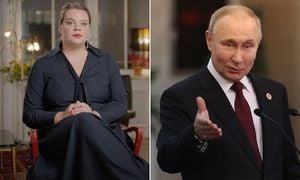The recent remarks by Yoo Si-min, renowned South Korean writer and political commentator, have stirred considerable controversy, triggering discussions about loyalty, power dynamics, and the complex web of relationships within the nation’s political framework. Yoo's provocative statements came during his appearance on various media platforms, particularly highlighting the impeachment trial of President Yoon Suk-yeol and the ensuing political friction.
On February 25, Yoo appeared on the CBS program "CBS Magazine," where he characterized the political ambition of some leaders as transgressing the boundaries of altruism. His critique of Kim Dong-yeon, the Governor of Gyeonggi Province, painted him as '배은망덕' (ungrateful), accusing him of ignoring the support he received during his election campaign. This idea of gratitude and the ethical dimensions of political allegiance have become central to connect the dots amid the narrative of loyalty versus betrayal.
During the conversation on the CBS program, Yoo stated, "I think it is commendable to challenge the status quo, even if it means running for president, but there’s also the strategic need to be the virtuous second." This encapsulates his perspective on political ambition being inherently altruistic yet strategically complex.
The rich discussions during the show coincided with another significant event, the live broadcast of "Questions by Sohn Seok-hee," which aired the same day after the final argument of Yoon’s impeachment trial. Organized by MBC, the program included discussions among various political analysts and commentators reflecting on the nuances of the impeachment trial, pointing to the rifts within South Korean political society.
Among the panelists was Kim Hee-won, the News Standard Editor-in-Chief of Hankook Ilbo, alongside other notable figures including lawyer Geum Tae-seop and senior cultural reporter Heo Min. The discussions were aimed to bridge diverse perspectives, shedding light on enduring societal tensions following the impeachment and envisioning paths toward reconciliation.
The impeachment trial itself has been described as indicative of broader social fractures, with Yoo remarking, "An eventual ruling will likely lead to discussions about early elections and the political ramifications for all involved," reflecting concerns about the political vacuum and instability triggered by such trials.
Yoo's perspective and critiques emerged not just as personal opinion but as reflection of a growing sentiment among certain factions within the Democratic Party, particularly with regards to leader Lee Jae-myung and his supporters. Yoo remarked, "The Democratic Party should ideally focus on middle-class and marginalized voices," subtly aligning himself with progressive values even as he casts judgment on the actions of key figures like Kim Dong-yeon.
Interestingly, Yoo’s criticisms have not only sparked debates around political loyalty but have also revived discussions about the core messages and consequences of the Democratic Party’s historical shifts. Notably, during the same discussions, Yoo commented on the party's gradual transformation, emphasizing its role as a vehicle for change to overcome the divides between urban and rural communities.
Several commentators have noted the weight of Yoo's words, highlighting the fact he has transitioned from being recognized as a champion of progressive ideals to someone perceived as leaning toward factionalism within his party. His remarks spurred debates on whether his criticisms were aimed at genuine party reformation or simply reflective of personal ambitions within the factional strife influenced by the looming threat of future elections and political aspirations.
According to commentators like Sohn Seok-hee, who hosted the February 25 discussion, "This is not merely about the impeachment trial or who leads -- it's about how political figures interact within the constructs of loyalty and power dynamics. The essence of those discussions must lead us to focus on governance beyond mere electoral interests." This highlights the growing recognition among public figures of the need for meaningful discourse to facilitate societal dialogue and cohesion.
The discussions saw heightened tensions as political factions grappled not only with their internal dynamics but also with public expectations. The issues raised were poignant and relevant, reflecting the broader dilemma facing many political entities within South Korea. Yoo’s take on the loyalty debates serves as both critique and commentary on the multifaceted connections and conflicts among the political elite.
It remains to be seen how these discussions shape the political future of South Korea as political leaders strategize their positions moving forward. Media analysts are closely watching to see how Yoo's commentary will influence public sentiment within the Democratic Party and its potential impact on forthcoming elections.
Meanwhile, Zhao Ji-min, voice of the popular progressive YouTube show, articulated concerns about Yoo's polarizing comments, stating, "The divisive language employed by figures like Yoo may lead to irreparable rifts—a situation detrimental to the party’s integrity and unity." This growing realization among political commentators signals the need for perhaps less combative rhetoric to steer the political discourse toward unity and proactive governance.
Overall, the events and discussions surrounding Yoo Si-min's recent remarks blend questions of ethical loyalty, political ambition, and the historical trajectories of South Korea's political party structures—weighty themes demanding careful navigation as the nation heads toward potential electoral challenges and seeks paths for cohesive governance.



